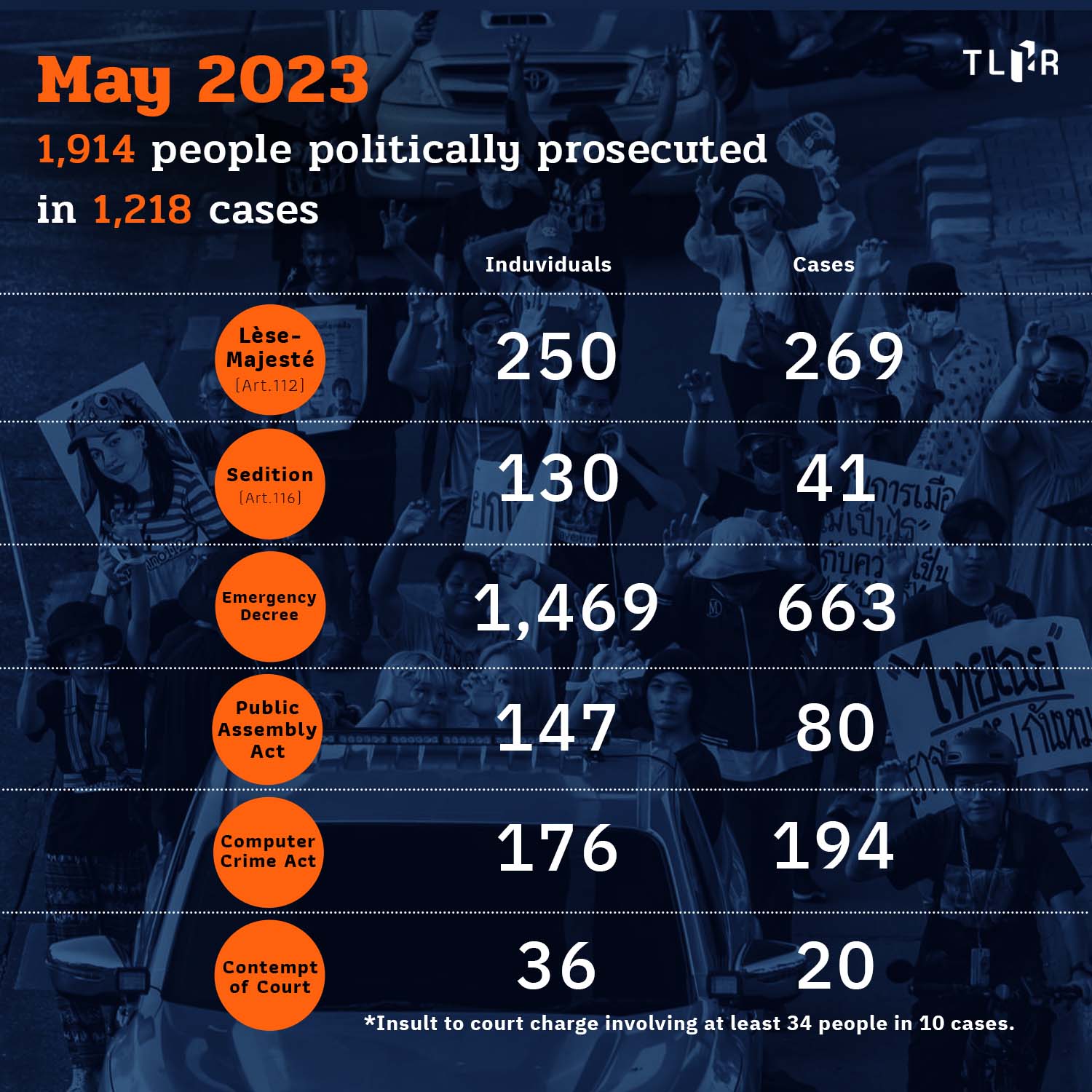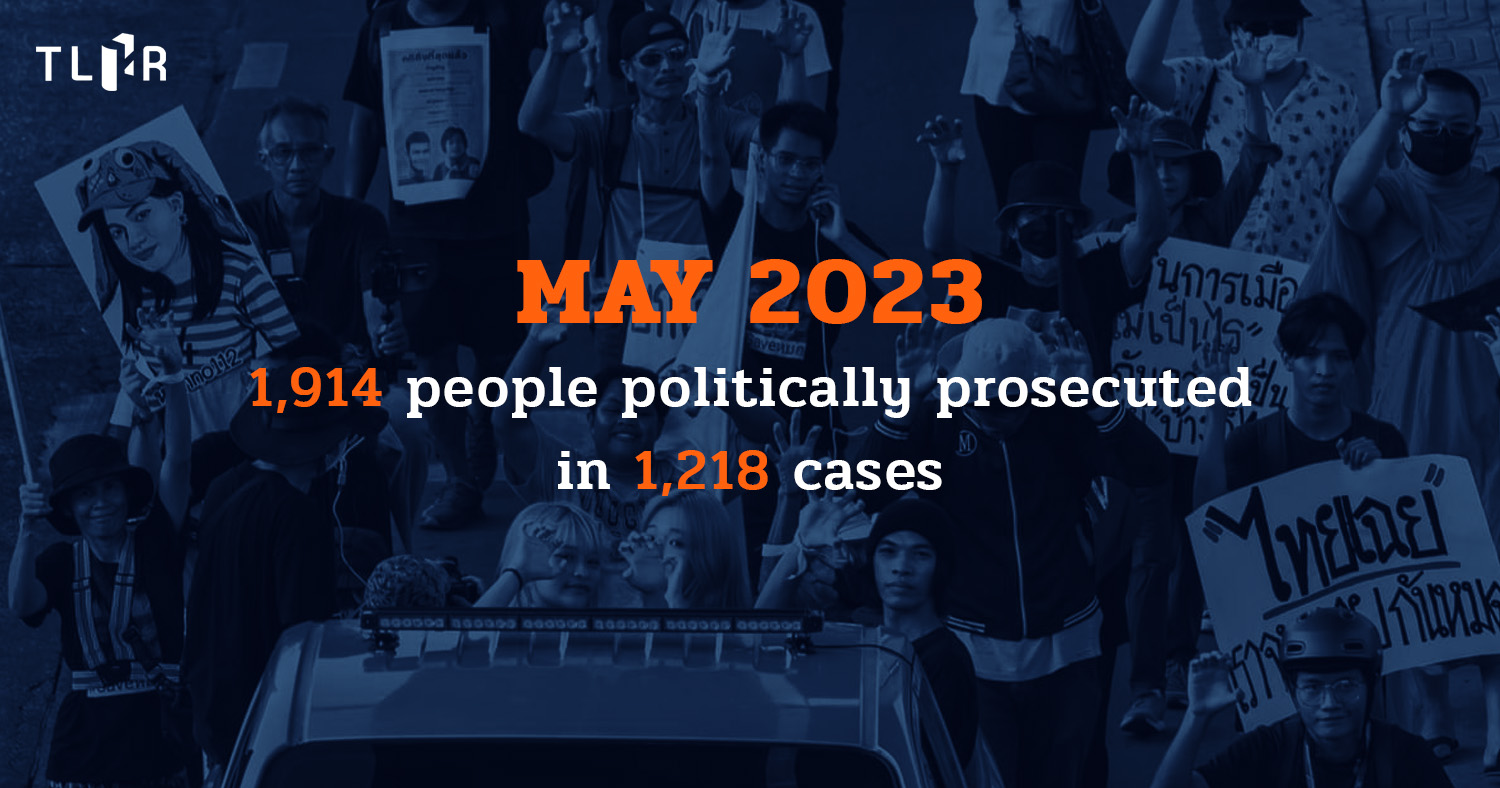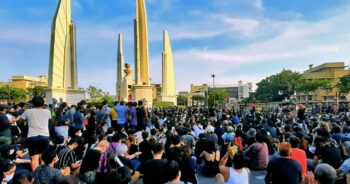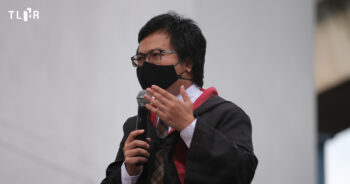With the election happening last month, May started with the echoes of people who want to see political changes. Meanwhile, cases related to political expression and assemblies continue. In addition to cases already in court, this month saw at least seven new lese-majeste cases: two involve youth, one involves accusations by the Office of The Constitutional Court against Chiang Mai-based activists for “insult to the court,”; and several others involve defamation lawsuits filed by government agencies and large companies against citizens for expressing opinions.
According to the TLHR statistics, at least 1,914 people have been prosecuted in 1,218 cases due to political participation and expression since the beginning of the “Free Youth” protest on 18 July 2020 until 28 February 2023.
Among this number are 215 cases involving 286 children and youths under 18 years old, including 43 below 15 years old and 243 between 15 – 18 years old.
Compared to April 2023, this month’s statistics saw an increase of 12 people and 15 cases (only counting those never charged before).
If we also count and include those who are charged redundantly in multiple cases, we found that there would be at least 3,851 instances of prosecution in total.
The prosecution can be grouped according to key charges used, as follows:
1. The royal defamation or “lèse-majesté” charge under Section 112 of the Penal Code: at least 250 individuals in 269 cases.
2. The “sedition” charge under Section 116 of the Penal Code: at least 130 individuals in 41 cases.
3. Charges of violation of the Emergency Decree: at least 1,469 people in 663 cases (since May 2020 when the first lawsuit against protesters and political activists was filed)
4. Charges under the Public Assembly Act: at least 147 people in 80 cases.
5. Charges under the Computer Crime Act: at least 176 people in 194 cases.
6. Contempt of court charge: at least 36 people in 20 cases and insult to the court charge involving at least 34 people in 10 cases.
Out of the mentioned 1,218 cases, 359 have been concluded, meaning over 859 cases are still ongoing at various stages.

.
The prosecution trends in May 2023 show the following key developments:
Eight more people were charged with Lese Majeste, including two 15-year-olds, while verdicts have been steadily issued for existing cases.
As far as the statistics of the lese-majeste lawsuits are concerned, we are aware of at least seven new cases being filed against eight people, including two children. The TLHR provides legal aid to the case of “May,”; who was accused by Naengnoi Assawakittikorn at Muang Phitsanulok Police Station of a Facebook post in November 2020 when May was only 14 years and one month old. As such, she is the youngest child to date charged with this offence. May was informed of the charge on 15 May 2023, after the public prosecutor demanded that her case be processed. Initially, she had given statements to the police, but the police neither pressed charges nor prosecuted her.
Another lese-majeste case against a child younger than 15 years old filed with Muang Phitsanulok Police Station has also come to the TLHR’s attention. The details remain unknown.
Last month, there was also the case of “Charan,”; a man from Hat Yai who was arrested by the police under a warrant issued by Nonthaburi Provincial Court and brought to Muang Nonthaburi Police Station to be charged with Lese Majeste for a social media post.
At first, the court did not allow bail for Charan during the investigation. He was granted it, however, after the second attempt by relatives and after nine days behind bars,
In another case, Songpol “Ya Jao” Sonthirak, a Talu Fah member, went to hear the charges at Muang Khon Kaen Police Station, after he was accused by a Thai Pakdee Party MP for flashing a three-finger salute to Princess Sirindhorn during a graduation ceremony.
In the South, Theeramate, a 19-year-old political activist with an intellectual disability, received a summon warrant from Thale Noi Police Station in Phatthalung Province to hear the lese-majeste charge. His lawsuit was initiated by Songchai Nienhorm, president of the King Protection Group. Theeramate’s lawyer submitted a letter to the Royal Thai Police Headquarters to require the inquiry officer to travel to Bangkok in order to inquire Theeramate there given his right as a person with disability.
As for cases in the court, witness examination has been taking place in parallel with verdicts that have been issued by various courts. In May, the Court of First Instance passed verdicts in seven cases, five of which followed the defendants’ confession. In the case of Weha, the Court passed a sentence of imprisonment of a term of 3 years and 18 months without suspension and did not allow bail during appeal. Similarly, in another case against a citizen, Patihan, the Court also gave a suspended sentence, while the defendant is awaiting bail during appeal.
As for the cases where the Defendants decided to defend, the courts have issued verdicts in two cases. One is that of “Ramil,”; a Chiang Mai University student accused of giving a performance art imitating a Garuda and pointing at a royal portrait. The Chiang Mai Provincial Court issued an order of acquittal; because the plaintiff’s witnesses failed to convince the Court that the defendant’s act defamed, insulted or threatened the King
The other involves “Virus,”; a security guard accused of posting three statements on Facebook and two on Tiktok about King Rama IX and X. He defended in the part alluding to the late king that it was not within the scope of the lese majeste law. However, the Criminal Court ruled that defaming a former king would naturally affect the current king as well, and that he was guilty on all charges. Virus was sentenced to a jail term of 15 years, reduced to 5 years and 30 months, and suspended for 3 years. In this case, the Chief Justice of the Criminal Court also gave a dissenting opinion that the suspension of penalty was not appropriate.
Meanwhile, the Appeal Court issued a verdict in one case, namely that of “Narin,”; who was accused of fixing “Gukult” stickers across the eyes on King Rama X’s portraits. This decision; overturning the lower court’s decision and acquitted the Defendant. The Court held that the Plaintiff’s witnesses and evidence contained considerable doubts as to whether the Defendant had really committed the alleged act or not. Therefore, it could not be heard that the Defendant was the offender.
In addition to Weha, until the end of May, there was at least one person, as far as we are aware of, under detention during trial for a lese-majeste case. Wut, a security guard of a factory, has been behind bars for over two months, after he was indicted at the Minburi Criminal Court and denied bail.
.
One new case of failure to notify an assembly was filed, while the court decisions on the Emergency Decree cases are split into two directions.
In the past month, one new case related to protests emerged, namely the case of the International Workers’ Day march from Ratchaprasong Intersection to Pathum Wan Intersection. After the event, three people were summoned on warrant by police from Pathum Wan Police Station for not having notified them of the assembly in accordance with the Public Assembly Act and for an unpermitted use of amplifiers. Two of them denied all charges and are preparing for a legal defense, while the other agreed to a fine.
At the same time, there were also instances where the police made arrests of individuals in cases related to the violation of the Emergency Decree during the 2020 protests. One such case is that of Chonthicha Kumjan-ad, a heavily pregnant woman arrested in connection to the 21 October 2020 protest. The case arose despite the fact that the courts have been acquitting the defendants in almost all cases related to this protest.
It was found that at least 507 Emergency Decree cases related to the protests during 2020 – 2022 are still ongoing, 223 of which are in the court. The cases where the defendants were acquitted last month include those from the protest to hand the People’s Letter on 9 November 2020 and the protest in front of the parliament on 24 September 2020. On the other hand, there were also cases that have led to a conviction, including the case of the Democratic Revolution commemoration event on 24 June 2020, which received a punishment of a fine, and the Satun Car Mob, which received an order of suspension of the determination of punishment.
As for the trend of the court’s discretion of the politically-motivated Emergency Decree cases, we have found that it has been clearly split into two directions – on the one hand are the courts that favor strictly banning assemblies during the pandemic and on the other are those leaning towards striking a balance between an exercise of the freedom of assembly and Covid-19; That said, the cases where the courts have issued orders of acquittal still outnumber those found guilty by two to one.
.
The Office of the Constitutional Court accuses Chiang Mai activists of “insult to the court,”; and the situation related to defamation lawsuits related to expression continues to intensify.
Another key situation related to legal prosecution in the past month is cases of insult or defamation brought by government agencies or large companies against people who have expressed their opinions.
Particularly, the Office of the Constitutional Court has filed a case against six activists in Chiang Mai for “insult to the court” due to their expression related to the court’s ruling on the petition ofn Gen. Prayuth Chan-ocha’s term of prime ministership. The group of activists went to hear the charges at Muang Chiang Mai Police Station on 22 May. This case was the second case since 2020 where citizens were sued by the Office of the Constitutional Court.
Doctor Supat Hasuwannakit, director of Saba Yoi Hospital, was accused of defamation and insult against an officer and the Computer Crime Act by the Spokesperson of the Ministry of Public Health for publishing data on the Rural Doctor Society Facebook Page.
GULF Energy company has filed a lawsuit against Sarinee Achavanuntakul, an independent writer and scholar, with both civil and criminal defamation charges. Likewise, Thanapol Eawsakul, editor of Same Sky Books, was sued by Top News company for a post suggesting that Top News had spread fake news.
There was also the case of Ngamsaengluang, a bookstore owner who was accused by Boonrawd company of the Computer Crime Act for posting that tear gas was fired from the company’s area during the protest on 17 November 2020. The Bangkok South Criminal Court has acquitted the defendant after the trial had been ongoing for more than two years; because the circumstance did not constitute an element of crime under Section 14 (1) of the Computer Crime Act as alleged. Previously, the court acquitted two other citizens sued by the same company.
The use of the defamation law in all of its forms against those expressing opinions about the work of a government agency or a large company has created legal burdens on them with an aim to limit their expression. Such a practice is called a “strategic lawsuit against public participation” or SLAPP and is a phenomenon that undermines the freedom of expression in Thai society.




